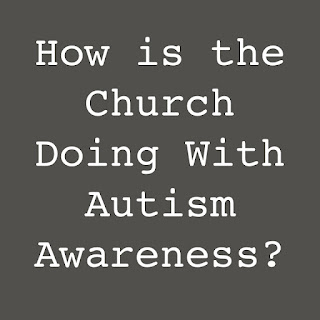I'm thankful to have Graham Ware share his story about being a relatively autism dad. Graham is the pastor of Centre Street Baptist Church and is also an army chaplain with Canadian Armed Forces reserves.
In January of this year, my 4 year old daughter Karyss was diagnosed as on the Autism Spectrum. Recently Stephen asked me if I'd be willing to offer a reflection on being a new "autism dad". I agreed, but I have struggled with what it means to be an autism dad because Autism Spectrum Disorder is just that; a spectrum. My experience with Karyss' autism can hardly be considered standard. Being a parent of a child on the spectrum can vary incredibly. It can be said if you've met one preson on the spectrum, you've met one person on the spectrum. So while Karyss is on the Autism Spectrum, it's hard to consider myself an "autism dad". I'm Karyss' dad. That I can speak to.
So what's it like being Karyss' dad?
It's great. It's exhausting. It's stressful. It's funny. It's overwhelming. Basically, it's parenthood. Each person on the Autism Spectrum presents in a unique way. There are of course common things which show up to varying degrees. Specifically in Karyss' case, she is able to speak, though her words aren't always clear. She can describe things, and express her needs and wants. But she has significant trouble with social language, so having a conversation is difficult. She often "parrots" (repeats sentences she's heard which may or may not have anything to do with the situation). She struggles to engage in social situations, and often wanders away and prefers to play by herself. She has repetitive behaviours, and quirks which help her cope with stress and over-stimulation; she frequently uses objects to drum on tables, stairs, railings, etc, or does headstands on the couch, or twirls a piece of clothing, or chews, or moans. These may produce some awkward social situations, as these behaviours become more frequent and more intense when she's in public and having elevated amounts of sensory data to process. This makes it difficult to be out in public for extended periods of time, and when we do, it creates more stress and anxiety for us as parents. This is of course something all families encounter to a certain extent. Children have tantrums in the grocery store. Children miss social cues. For Karyss this happens more often, and for different reasons than other children. We don't always know how Karyss will manage in a given situation. She recently got invited to classmate's birthday party. We had no idea whether she'd be able to handle the noise and chaos of the situation (but she did very well). Will she melt down in church this week? Can she make it through a day of school without throwing something? If we go to the park, will she try to take off on us? If we go out, will she co-operate with a babysitter? Can we take them to this event or that place?

The bigger issue for our family is sleep. One of the ways Karyss' autism presents is in her inability to stay asleep through the night. Because autism often results in sensory processing differences, some children, like Karyss, when awoken, cannot simply roll over and go back to sleep. Their sensory processing immediately kicks in, and so Karyss is fully awake, and ready to go. Even if it's 1am. And it typically takes a few hours to get her to resettle. This happens almost every single night. Karyss is 4 now. My wife and I haven't had a solid 8 hour sleep in over four years.
Autism is our reality. Is it a struggle? Yes, of course. All parenting is. Karyss requires extra attention and patience. We have to decline invitations to events. We can't go certain places together as a family, because Karyss can't handle to noise, crowds, stimulation; a simple trip to a restaurant can be quite the ordeal.

But Karyss is still an absolute joy. I know all parents are supposed to say that, and I assume they all mean it, and so do I. You've never really understood the greatness of a hug until you've had a Karyss hug. Karyss makes us laugh more than she makes us crazy. I still thank God for her. Her name was inspired by 1 Cor. 1:15 "in order that you might be doubly blessed" (she's our second daughter). The Greek word charis (which we modified the spelling of) means grace or blessing. I stand by that name choice. She is a blessing. We've had to make some adjustments, and rearrange our lives- more appointments with therapists and specialists, my wife and I taking turns staying up with Karyss, planning our social lives around her needs, etc. But in terms of coming to grips with the diagnosis, I didn't have a huge struggle with it. Perhaps that's because it was confirmation of something we'd been expecting, so there wasn't a shock. It was almost a relief. With a dianosis comes access to resources, training for us as parents, assistance for Karyss, and an ability to advocate clearly for her. We can get behind her now, and help her flourish, as she works out the image of God in her own unique way.









